Comedian Sacha Baron Cohen asks judge to dismiss Roy Moore lawsuit
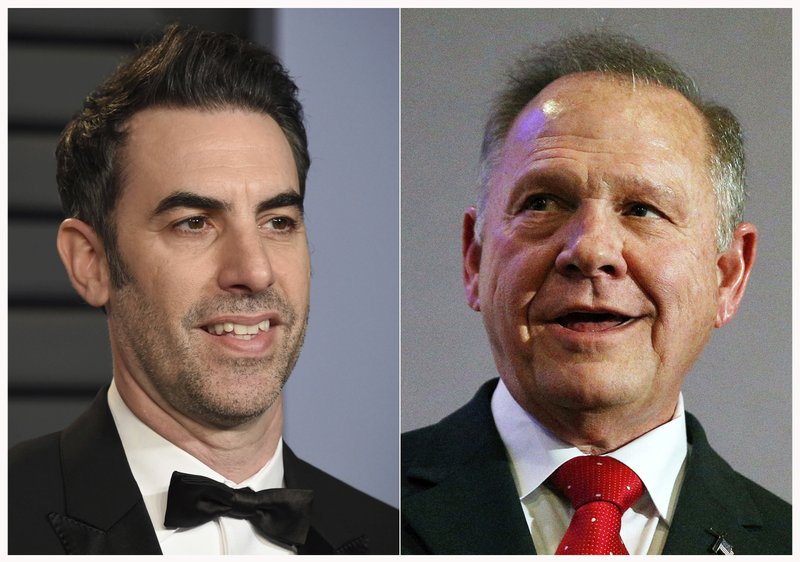
Comedian Sacha Baron Cohen asked a federal judge to dismiss Roy Moore’s defamation lawsuit over a television segment that lampooned Moore in the wake of sexual misconduct allegations. Lawyers for Baron Cohen, Showtime Networks and CBS wrote last week in a joint court filing that Moore signed an agreement waiving all legal claims before appearing on the “Who is America?” segment. They said in the agreement that Moore waived claims related to the program and anyone associated with it. They also said the segment was satire and is protected under the First Amendment. “This lawsuit conflicts directly with the long tradition of First Amendment protection for political parody and satire of public figures — especially where the satirical work ‘could not reasonably have been interpreted as stating actual facts about the public figure involved,’” lawyers wrote. The segment ran after Moore faced misconduct accusations during the 2017 Senate race in Alabama. He has denied the allegations and is running for Senate again in 2020. Moore said he was told he was receiving an award for supporting Israel when he agreed to appear on the show. Instead, Baron Cohen lampooned him as a possible pedophile. In the segment, Baron Cohen appeared as faux counterterrorism instructor “Col. Erran Morad,” discussing bogus military technology, including a supposed pedophile detector. The device repeatedly beeped as it got near Moore, who sat stone-faced. Moore argued that the waiver was fraudulently obtained because it did not disclose he was dealing with the comic. Baron Cohen has faced past lawsuits over similar pranks, but those actions were tossed because the individuals had signed releases. In 2008, a New York judge tossed out lawsuits brought by a driving instructor and two etiquette school teachers who said they were duped into appearing in the movie “Borat” in which Baron Cohen plays an awkward foreign journalist traveling the United States. The judge said they accepted money and signed agreements releasing the filmmakers from liability. Moore agreed to accept $200 for the charity of his choice, according to the agreement.Moore filed the lawsuit in Washington, D.C., but it was moved to New York, where the agreement mandates that disputes would be heard. Republished with the permission of the Associated Press.
J. Pepper Bryars: Alabama moves to protect free speech on campus
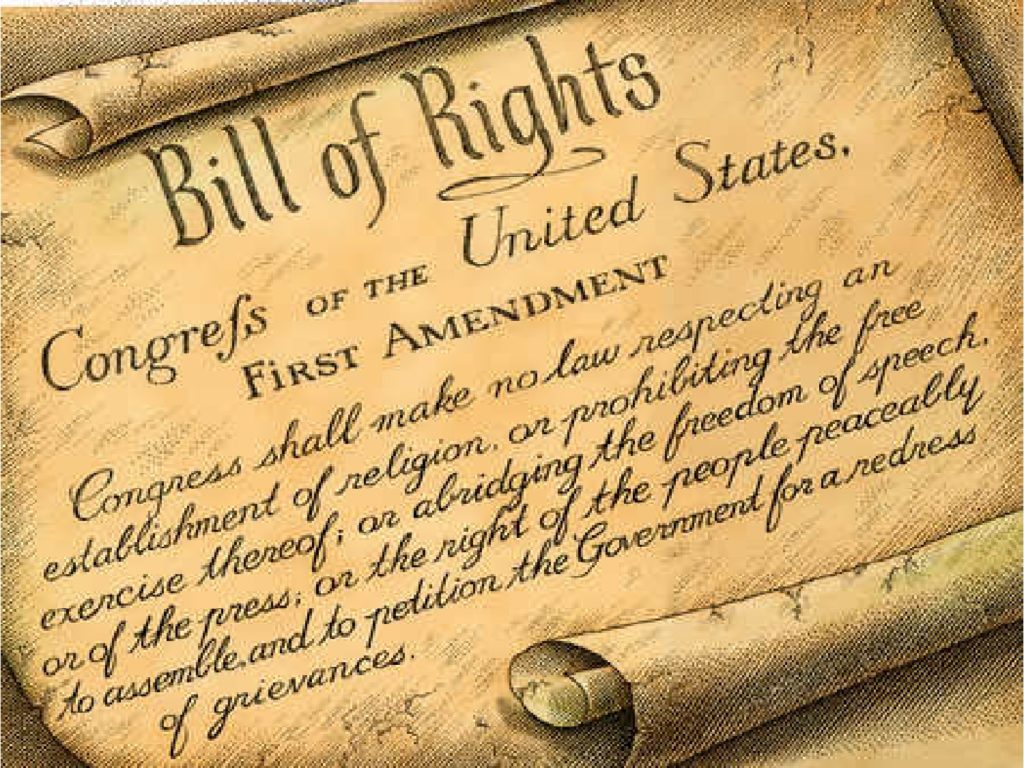
Free speech zones, meant to move certain discussions away from where they could offend listeners, or be heard at all. Speech codes, meant to limit acceptable topics to an ever-shrinking list of progressive-leaning beliefs. And heckler’s vetoes, meant to give the power of censorship to a loud minority. These tactics and others are part of a trend on college campuses that is chilling the free speech rights of faculty, students and visiting speakers who dare mention controversial or unorthodox ideas. Thankfully, lawmakers in Alabama have an opportunity to ensure the trend doesn’t take hold here by passing what is being called “one of the most comprehensive and effective campus free-speech laws in the country.” State Rep. Matt Fridy, Republican -Montevallo, has introduced House Bill 498 that would require the state’s public colleges and universities to adopt policies and procedures to protect free speech on campus. The bill was recently approved in committee and now awaits further action. “Freedom of expression is critically important during the education experience of students, and each public institution of higher education should ensure free, robust, and uninhibited debate and deliberation by students,” the bill states. It goes on to declare that it is not the proper role of these schools to “shield individuals from speech that is protected by the First Amendment to the United States Constitution, including ideas and opinions the individuals may find unwelcome, disagreeable, or offensive.” But is campus free speech really a problem in Alabama? Yes, at least according to one expert who has helped draft similar campus free speech laws in other states. “Although it’s sometimes argued that the campus free speech crisis only affects deep-dyed blue states like California and Massachusetts, the problem is national,” wrote Stanley Kurtz, a senior fellow at the Ethics and Public Policy Center. Kurtz noted how Alabama A&M near Huntsville recently made it on the “10 Worst Colleges for Free Speech” list maintained by the individual-rights advocacy group FIRE for having the most “red light” rated policies that, in their view, restrict free speech. The Washington Examiner published an article last year accusing the University of West Alabama in Livingston of having a “free speech zone” by limiting any demonstrations to a spot near its student union building. And at the University of South Alabama in Mobile, a pro-life student club founded by Katherine Sweet was told in 2013 that they had to set up their display on an arguably low-traffic portion of the campus that’s designated for free speech. “I went to South thinking it would be a place where I could debate freely with other students, engage in discourse, and ultimately learn from not only our professors, but each other,” Sweet wrote in an AL.com guest opinion article. “Aren’t universities supposed to be atmospheres that promote just that?” Yes, and Fridy’s bill seeks to ensure they do through various measures, including: • Ensuring that faculty and students are free to take political positions, to express themselves in outdoor areas of the campus, and to assemble, speak and pass out literature,• Prohibiting the establishment of any “free speech zones,”• Keeping the campus open to anyone invited by student groups to speak,• Forbidding the imposition of excessive security fees that discourage some speakers,• And potentially suspending those who disrupt the free speech of others.Voltaire’s beliefs in freedom of expression were once famously summarized with the phrase, “I disapprove of what you say, but I will defend to the death your right to say it.” But unless our lawmakers act now, what you may hear on your local college campus could someday be, “I disapprove of what yousay, so I will restrict your right to say it.” J. Pepper Bryars is a senior fellow at the Alabama Policy Institute. Follow him on Twitter at @jpepperbryars.
Appeals court blocks Alabama execution of Muslim inmate

A federal appeals court on Wednesday blocked the planned execution of an Alabama inmate to consider whether the state was violating the Muslim inmate’s rights by not allowing an imam to replace a Christian prison chaplain in the death chamber. Alabama may be violating the religious rights of a Muslim inmate set for execution Thursday by refusing to allow an imam present at his death, a federal court said Wednesday in blocking the lethal injection. The 11th U.S Circuit Court of Appeals granted a stay for Dominique Ray, 42, a day before his scheduled execution for the slaying of a teenager more than two decades ago. The state is still pushing for the execution to take place Thursday, though, and swiftly changed its execution protocol in response to the judges’ concerns. The Alabama attorney general’s office on Wednesday afternoon asked the U.S. Supreme Court to vacate the stay. Ray objected to Alabama’s practice of allowing a Christian prison chaplain, who is a prison system employee, to stand near the inmate during the lethal injection and to pray with the inmate if the inmate requests that. Ray asked to bring in his imam to stand near him during the procedure, but was told he could not because only prison employees were allowed in the execution chamber. A three-judge panel of judges wrote that it was “exceedingly loath to substitute our judgment on prison procedures.” But, they added that it “looks substantially likely to us that Alabama has run afoul of the Establishment Clause of the First Amendment.” “The central constitutional problem here is that the state has regularly placed a Christian cleric in the execution room to minister to the needs of Christian inmates, but has refused to provide the same benefit to a devout Muslim and all other non-Christians,” the three-judge panel wrote. The Alabama chapter of the Council on American-Islamic Relations said it supported Ray’s bid to have an Islamic leader present. “We welcome this decision and hope Mr. Ray will ultimately be provided equal access to spiritual guidance,” Ali Massoud, government affairs coordinator for CAIR-Alabama, said in a statement. In the request to vacate the stay, the Alabama attorney general’s office said as a result of the 11th Circuit order, the state has amended its lethal injection protocol so that the chaplain will no longer be present. State attorneys said inmates can have their spiritual adviser witness the execution from a room adjoining the execution chamber. Robert Dunham, executive director of the Death Penalty Information Center, which studies capital punishment in the U.S., said other states generally allow spiritual or religious advisers to accompany the inmate up to the execution chamber but not into it. Instead the adviser can view the execution, as do others, from a designated area. He did not know of any other states where the execution protocol calls for a Christian chaplain to be present in the execution chamber. Ray was convicted in the fatal stabbing of a 15-year-old Tiffany Harville. Harville disappeared from her Selma home in July 1995. Her decomposing body was found in a field a month later. Ray was convicted in 1999 after co-defendant Marcus Owden told police that they had picked the girl up for a night out on the town and then raped her. Owden said that Ray cut the girl’s throat. Owden pleaded guilty to murder, testified against Ray and is serving a life sentence without parole. Ray’s legal team on Wednesday asked the U.S. Supreme Court to stay the execution on other grounds. They argued it was not disclosed to the defense team that records from a state psychiatric facility suggested Owden suffered from schizophrenia and delusions. Attorneys asked the Supreme Court to halt the execution to examine whether the state had a duty to find and produce the information. Republished with permission from the Associated Press
Jeff Sessions, Justice Department defend college students First Amendment rights
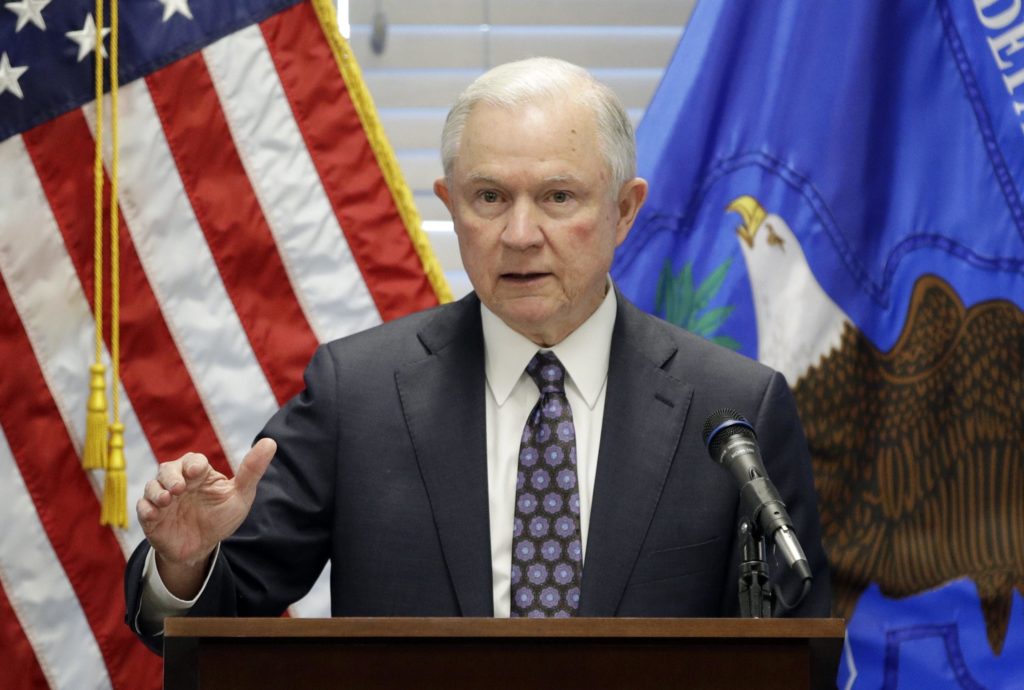
Jeff Sessions is making headlines this week and setting off the liberal left with common sense, constitutional actions. Among his actions giving the “open minded,” “tolerant,” progressives heartburn is the fact that the Justice Department has decided to take on schools infringing on students First Amendment rights under the guise of attempting to police “biased speech.” Weighing in on a University of Michigan case, the Justice Department said: The Department of Justice today filed a Statement of Interest in Speech First, Inc., v. Schlissel in the Eastern District of Michigan. The plaintiff, Speech First, a nationwide organization dedicated to defending civil liberties, alleges that the University of Michigan has adopted policies prohibiting and punishing speech protected by the First and Fourteenth Amendments. Speech First alleges that the University of Michigan’s policies on “harassment,” “bullying,” and “bias” are so vague and overbroad as to prompt students to limit their speech out of fear that they might be subject to disciplinary sanction, including “individual education” or “restorative justice” at the hands of the University’s Bias Response Team. The United States’ Statement of Interest argues that the University of Michigan’s Statement of Student Rights and Responsibilities, which prohibits “harassment,” “bullying,” and “bias,” is unconstitutional because it offers no clear, objective definitions of the violations. Instead, the Statement refers students to a wide array of “examples of various interpretations that exist for the terms,” many of which depend on a listener’s subjective reaction to speech. The United States also argues that the University’s Bias Response Policy chills protected speech through its Bias Response Team. The Bias Response Team, which consists of University administrators and law enforcement officers, has the authority to subject students to discipline and sanction. It encourages students to report any suspected instances of bias, advising them: “[t]he most important indication of bias is your own feelings.” According to the plaintiff, the Bias Response Team has responded to more than 150 alleged incidents of bias in the last year. In filing the Statement of Interest, Acting Associate Attorney General Jesse Panuccio provided the following statement: “Freedom of speech and expression on the American campus are under attack. This Justice Department, under the leadership of Attorney General Jeff Sessions, is committed to promoting and defending Americans’ first freedom at public universities.” This is the fourth Statement of Interest filed by the Department of Justice in a First Amendment case under Attorney General Jeff Sessions. The first was filed on Sept. 26, 2017 in Uzuegbunam v. Preczewski, the second was filed on Oct. 24, 2017 in Shaw v. Burke, and the third was filed on January 25 in Young America’s Foundation and Berkeley College Republicans v. Janet Napolitano. In the case at hand in Michigan was summed up in an op-ed by Nicole Neily the president of Speech First, a membership association that defends students’ free speech rights on campus, published in the Hill: Michigan complements its code with something called a bias response team, a system that encourages fellow students who overhear comments (even ones taken out of context, between friends) to report offensive language to administrators, which is then tracked and publicly shared on the school’s website as a visible reminder of the student body’s various sins. Incidents are investigated, potentially subjecting students whose speech offends another student to punishment by process. Depending on the outcome, he or she may be sent for “restorative justice” — a benign euphemism for a modern-day reeducation camp — to atone for the thought crime in question. But even if he or she is exonerated, the stigma of going through such a process, as well as the distraction from his/her studies and the burden imposed on his/her time, serves to significantly deter students from expressing ideas outside the mainstream. Regardless of your positions on issues, we should all fear this type of selective thought and word-policing and the encouragement that in the real world it would be acceptable. Schools can’t force tolerance and decency on people. Nor should they be able to implement subjective rules to force alternative views and ban, or prohibit, the expression of dissenting views in the name of “bias.” Imagine the ways in which such subjective criteria could be used as a weapon to silence anyone at any time based on personal preferences of the listener. It is frightening that places of higher education where young adults should be encouraged to express themselves freely and to learn to approach conflict in a positive way and figure out outcomes themselves, administrators would implement such restrictive policies. If a student overhears something that they take offense to they have options A) Walk away or B) Respectfully confront the person talking. That’s what happens everyday in public places throughout our nation. No safe spaces needed. No infringing on one’s rights. There are still issues in our communities that are very controversial. I struggle with how I will talk with and what I will teach my children about the transgender community. I don’t come from a place of hate, or ignorance, or bigotry, but I do favor science and I believe strongly that you can’t simply declare your gender different than what your genetics say. My views are shaped by scientific research and my religion and were I to go back to school and find myself in an environment of discussion I should hope my thoughts would be as welcome as those opposed to mine. I would expect, if not demand, that my constitutional rights give me the ability to respectfully discuss my views without fear of disciplinary action. I wrote about an extreme version this campus censoring in a post about University of Alabama student Harley Barber, being forced out due to a video which included racist views. While her comments were certainly out of line and reprehensible, making her a pariah wasn’t the best course of action. Barber, like many others in college do at some point in early adulthood, spoke and acted from a place of ignorance. She just happened to do so in a racist way
From Roseanne to Jim Bonner why don’t people think before they post?

Enough already with the racist, sexist, otherwise insanely offensive social media posts. It’s not funny and in fact it’s down right inexcusable. We need to get past the types of messages and memes that have become common place in recent years. It seems that they’re coming at us from every angle. Here in Alabama we have Public Service Commission candidate Jim Bonner who has come under fire for some of his Facebook posts. To which he has laughed off as simply being a reflection of his sense of humor. For the record, I have a sense of humor and I’m harder to offend than most but even I can tell you that Hitler and the Holocaust are never funny. Nor are jokes about sexual assault and if you need to be told that then there’s no place for you in civil society let alone elected to a statewide board. Then you have Roseanne‘s racist tweet. Which she blamed on taking the sleeping medication ambien. The response by the network to her offensive posts was swift and firm – her recently rebooted show was cancelled. For Rosanne being offensive is part of her brand but even she should have known there are lines you don’t cross and racist remarks are among them. There are a number of “stars” from Bill Mahr to Joy Reid and Whoopie Goldberg who have made a name for themselves by pushing the boundaries of decency. The definition of decency is not politically biased. There are people on both sides who should be shouted down when they say things that are out of bounds. In our day and age the line isn’t even just drawn at offensive we’ve come to accept sentiments that we may not agree with but there’s just parts of offensive behavior that society won’t take. The line shouldn’t depend on intended audience. You’re missing the point if you make this about “Democrats being more offensive than Republicans” or vice-versa. Or to address Bonner again, it’s not enough to say “you have lost your sense of humor if you don’t find this funny.” While, I do genuinely believe that people often misinterpret things or take things too personally, there’s merit to a lot of the content being called out online as of late. There’s also a standard that has been lowered in recent years. President Donald Trump himself challenged the standards of acceptable behavior from a candidate and then after he won from an elected official and while I appreciate his methods of communication I do believe that the change isn’t only positive and the precedent he’s set with his tone have lowered the bar for civil discourse. There should be a higher level of a decorum. A higher standard. People should conduct themselves in a less offensive way. We live in a very polarizing, divisive time right now. We cannot and will not improve that if we do not draw the line, and every single time that someone crosses it (regardless of political affiliation or race) call them out to make then understand that society doesn’t accept what they’re doing or saying. Enough people! Think before you post and if you can’t help yourself you have no business in a position of influence.
Finally, the NFL takes a stand against the knee
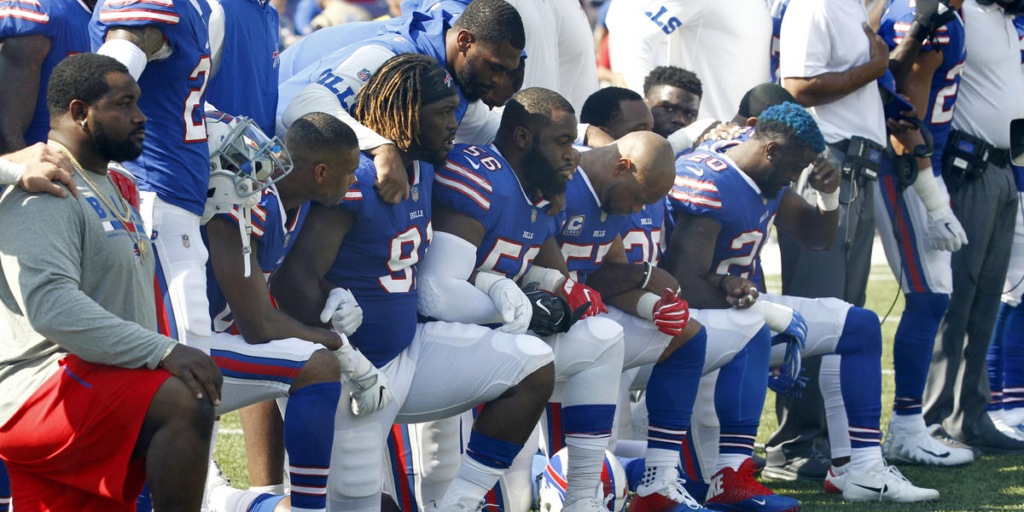
The NFL announced new guidelines for players, in terms of how the respond to the National Anthem on Wednesday, and my reaction is (along with the rest of patriotic America): FINALLY. For the love of all that’s holy, the NFL is a business. Now granted the players are athletes (in some cases also entertainers), they still work for a larger organization. And that organization has a message and goals of its own: NFL AND THE COMMUNITY Football and community are the twin pillars of the NFL. Whether nationally at the league level, locally at the team level, or individually through the volunteerism and philanthropy of owners, players, coaches and club personnel, there exists a powerful NFL-wide commitment to giving back. This commitment is year-round-there is no offseason to the NFL’s multi-tiered, ongoing work to strengthen America’s communities. Through the active involvement of the 32 NFL teams, and long-standing partners, the league is able to make a positive difference in America’s communities and connect with millions of fans each year. That message has been hijacked by those few who wish to have their political agendas drive the message of an entire organization made up of 32 teams and nearly 1,700 players. Saturday, Aug. 26, 2016 was the first day 49ers player Colin Kaepernick chose not to rise to his feet for the playing of the national anthem. The outcry against Kaepernick, and other players following suit, came to a head during the 2017 NFL season, when even President Donald Trump got involved and weighed-in. It seems unheard of that it would take the organization this long to stand up to those defiant, unpatriotic players and say ‘it’s time to stop politicizing sports. You can’t make the game into something that it was never intended to be.’ A political spectacle. In the past year and a half, I’ve seen a lot of people defend the players’ actions as protected by the freedom of speech. Everybody has First Amendment rights, even these players — it’s a wonderful thing. As someone who is involved in both politics and the news business, I certainly appreciate all the aspects of the First Amendment. Congress shall make no law respecting an establishment of religion, or prohibiting the free exercise thereof; or abridging the freedom of speech, or of the press; or the right of the people peaceably to assemble, and to petition the Government for a redress of grievances. At the same time, players need to understand you can’t just walk into your workplace and have your personal and political beliefs override the mission statement of said company and what they’re trying to accomplish. You have to separate the two. Starting football games with controversial political messages has led the NFL to lose viewers and supporters. That’s a loss of profits for the NFL and the teams. That’s unacceptable. I know that I personally have been disheartened and frustrated by the vocal minority of players who have chosen to take a knee during the National Anthem and the a sideshow that has become. Kudos to the NFL for taking back control of organization. Inevitably there will be players who make a mockery of this decision and try and cash-in another 15 minutes of political fame. I hope that their teams, coaches and teammates come down on them hard and say it’s time to get back to point of the NFL: football. Use your free time to exercise your first amendment rights.
Religious freedom could top Jeff Sessions civil rights priorities
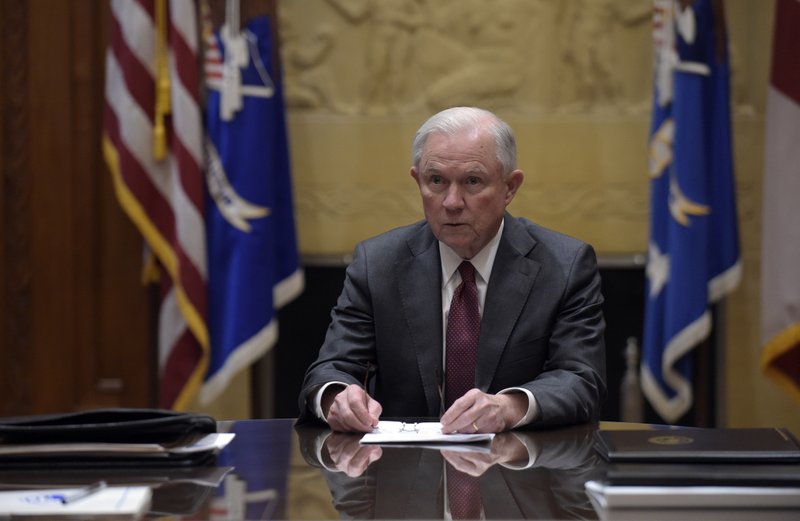
When President Donald Trump spoke to the National Prayer Breakfast this month, he underscored his vow to defend the religious rights of the conservative Christians who helped propel him to power. Now, they expect the Justice Department under new Attorney General Jeff Sessions will reposition itself as a champion of what they see as that religious freedom. It would be a welcome change for conservative Christians who say their concerns were marginalized under the Obama administration in favor of First Amendment and LGBT issues. Exactly how Sessions will approach the issue remains to be seen, but he has given them plenty of reasons to be hopeful. As a Republican senator from Alabama, Sessions, a devout Methodist, argued that the separation of church and state is unconstitutional, and that the First Amendment’s bar on an establishment of religion has been interpreted too strictly, while its right to free exercise of religion has been diminished. Asked at his confirmation hearing whether a “secular person” has “just as good a claim to understanding the truth as a person who is religious,” Sessions replied, “Well. I’m not sure.” That backdrop suggests Sessions’ Justice Department could more eagerly insert itself into religion-oriented cases such as that of the bakery fined for refusing to make a gay wedding cake, or the high-school football coach fired for praying on the field after games, who Trump repeatedly mentioned during his campaign. “Religious conservatives have sort of been the forgotten people,” said Hiram Sasser, deputy chief counsel for First Liberty Institute, a law firm that specializes in issues of religious liberty. “Now, we have a refreshing sort of reboot to be able to have at least a voice, and to be able to once again have a seat at the table.” Sessions could bring major changes throughout the Justice Department. But the department’s civil rights division traditionally is subject to the most radical shift in agendas with each change in presidential administration. Where the Obama Justice Department wanted to leave its mark on reforming troubled police departments, Sessions will likely use its resources differently. On his first full day on the job, Sessions signaled a shift away from Obama priorities when the Justice Department changed its legal position in a case involving transgender rights. The department is no longer asking a judge to limit an injunction restricting the federal government from telling schools that students should be able to use bathrooms and locker rooms corresponding to their gender identity. Transgender rights were a focus of the department under former Attorney General Loretta Lynch, who sued the state of North Carolina over a bathroom bill that the government said discriminated against transgender people. Such a move would be improbable in an administration like Trump’s, which has already signaled its deference to states’ rights. It’s unclear exactly what priorities Sessions will pursue when it comes to the civil rights division. The Justice Department declined to comment on his plans for enforcement of religious freedom. He has faced intense criticism of his record on civil rights with regard to race. A renewed focus on religious causes would be “especially troubling in light of the fact that increasing numbers of Americans are not religious,” said Marci Hamilton, a Yeshiva University legal expert on religious liberty. “This landscape is radically different.” But it would help satisfy Trump’s campaign promise to his Christian political base. While the appointment of Sessions is a promise fulfilled, some religious conservatives remain concerned that Trump won’t deliver. When he was Indiana’s governor, Vice President Mike Pence signed a religious freedom law but softened it after criticism that it was discriminatory, a move that disappointed some conservatives. Trump still has not signed an executive order to boost protections for those with religious objections to gay marriage and create a working group within the Justice Department to protect “the religious freedom of persons and religious organizations.” Groups ranging from the U.S. Conference of Catholic Bishops to Sasser’s First Liberty Institute have launched campaigns urging Trump to enact broad protections for religious objectors to laws such as gay marriage and abortion. His civil rights division could bear a close resemblance to that of the Bush administration, which took a keen interest in matters of religious freedom. It touted its work on human trafficking, an issue of importance to religious conservatives, as a counter to claims that it was weak on civil rights enforcement. Such trafficking cases could again dominate the civil rights division’s criminal caseload, while prosecutions of police officers for rights violations, for example, might move to the back burner, said William Yeomans, who spent 24 years as a lawyer in the civil rights division during Democratic and Republican administrations. The department could insert itself in federal lawsuits on behalf of faith-based groups, among other actions. It could aggressively enforce the provision of the Civil Rights Act that bans workplace bias based on religion, and also a law designed to let churches and other religious institutions skirt zoning restrictions, which the Obama administration used to sued several cities that refused to allow the construction of mosques. Said Mat Staver, founder and chairman of Liberty Counsel: “You’re going to see a big effort to protect religious freedom. It’s a welcome change.” Republished with permission of the Associated Press.
Justices raise doubts over law barring offensive trademarks
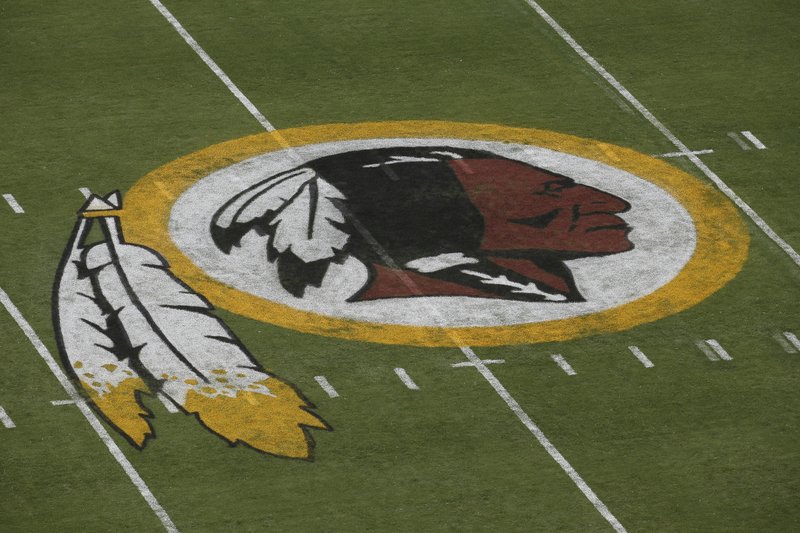
In a First Amendment clash over a law barring offensive trademarks, the Supreme Court on Wednesday raised doubts about a government program that favors some forms of speech but rejects others that might disparage certain groups. The justices heard arguments in a dispute involving an Asian-American band called the Slants that was denied a trademark because the U.S. Patent and Trademark office said the name is offensive to Asians. Justice Elena Kagan reflected the concerns of several justices when she said government programs are not supposed to make a distinction based on viewpoint. “The point is that I can say good things about something, but I can’t say bad things about something,” she said. “And I would have thought that that was a fairly classic case of viewpoint discrimination.” The Oregon-based band says the 70-year-old law violates free-speech rights. A federal appeals court had ruled that the law is unconstitutional, but the government appealed. A victory for the band would be welcome news for the Washington Redskins, embroiled in their own legal fight over the team’s name. The trademark office canceled the football team’s lucrative trademarks in 2014 after finding the word “Redskins” is disparaging to Native Americans. But the justices also seemed concerned that imposing absolutely no limits on trademark names might go too far. At issue is a law that prohibits registration of marks that “may disparage … persons, living or dead, institutions, beliefs or national symbols.” A trademark confers certain legal benefits, including the power to sue competitors that infringe upon the trademark. Slants founder Simon Tam says his goal was to reclaim a derisive slur and transform it into a badge of ethnic pride. But the trademark office said a term can be disparaging even when used in a positive light. A federal appeals court sided with the band, ruling that the law violates the First Amendment. The Obama administration wants the high court to overturn that ruling. Justice Department lawyer Malcolm Stewart told the justices that the law does not restrict speech because the band is still free to use the name even without trademark protection. Stewart said the government was concerned about allowing trademarks for racial slurs, religious insults and the “vilest racial epithets” that distract consumers and hinder commerce. Justice Stephen Breyer wasn’t impressed, saying he could think of “perhaps 50,000 examples of instances where the space the trademark provides is used for very distracting messages.” “What business does Congress have picking out this one, but letting all the other distractions exist?” Breyer asked. Justice Anthony Kennedy compared the trademark program to copyrights, noting that the government can’t bar disparaging copyrights. “We have a culture in which we have tee shirts and logos and rock bands and so forth that are expressing a point of view,” Kennedy said. “They are using the market to express views.” Justice Ruth Bader Ginsburg said the law wasn’t being enforced consistently, noting that the term “Heeb” was approved in one trademark application, but not in another. The term is considered offensive to Jews. John Connell, attorney for the Slants’ founder, said the First Amendment should allow trademark approval of virtually any expression without limits. But some justices seemed to think his argument went too far. The trademark law, for example, places restrictions on words that are libelous or cause confusion in the marketplace. “You want us to say that trademark law is just like a public park” where people can say whatever they want, Kennedy told Connell. “Good-bye. That’s it. That’s your argument.” Justice Sonia Sotomayor wondered about libelous trademarks. What if someone tried to register “Trump is a thief” before the president-elect became a public figure, she asked. Connell said that should be allowed. “That makes no sense,” Sotomayor said. Breyer noted that the Slants are free to use their name in all kinds of ways, just not in the trademark itself. “This is not a general expression program,” Breyer said. “It stops nobody from saying anything.” Like the Slants, the Redskins say their name is meant to honor American Indians. But the team has spent years fighting legal challenges from Native American groups that say it’s a racial slur. A federal judge upheld the trademark office’s cancellation of the name and the team is appealing. The matter is on hold pending the outcome of the Slants case. A ruling in that case is expected by the end of June. Republished with permission of The Associated Press.
Donald Trump’s idea of ‘presidential’ diverges from past presidents

Donald Trump, that most unconventional of presidential candidates, last spring pledged that he would act perfectly presidential when the time was right. “I will be so presidential that you’ll call me and you’ll say, ‘Donald, you have to stop that, it’s too much,’” he promised during a March television interview. Less than two months from Inauguration Day, there are growing signs that Trump’s idea of what’s presidential may never sync up with past norms — to the delight of some and dismay of others. The president-elect has kept up his habit of sending unfiltered tweets, directly challenged the First Amendment right to burn the flag and selected a flame-throwing outsider for a top adviser. He’s shown no hesitation to traffic in unsubstantiated rumors, has mixed dealings in business and government, and has flouted diplomatic conventions to make his own suggestion for who should be Britain’s ambassador to the U.S., a job that happens to already be filled. He’s picked numerous fights with individual journalists, disregarded past practices on press access and dabbled in the name-calling that was commonplace during his candidacy. Trump’s search for Cabinet nominees has played out like a reality TV show, with a number of candidates engaged in unabashed self-promotion while their assets and liabilities are publicly debated by members of the president-elect’s own transition team. (It’s normally a hush-hush process until the unveiling of an appointee). Trump’s tweet that “Fidel Castro is dead!” had none of the diplomatic subtleties normally associated with such an international development. Is all of this, then, the “new normal” for what to expect from a Trump administration or a reflection of the growing pains associated with any presidential transition? President Barack Obama, who knows a thing or two about making the big leap to the Oval Office, has expressed hope that the weight of the office will ultimately have a sobering effect on Trump, cautioning people against assuming “the worst.” “How you campaign isn’t always the same as how you govern,” Obama said in one of a string of recent comments trying to provide some measure of reassurance to those concerned about the next president. “Sometimes when you’re campaigning, you’re trying to stir up passions. When you govern, you actually have reality in front of you, and you have to figure out, ‘How do I make this work.’” Republican Rep. Mark Meadows of North Carolina, a strong conservative and a Trump defender, said of the transition, “You gotta break a few eggs to make an omelet.” But Thomas Mann, a longtime scholar of government from the Brookings Institution, said that while people can hope for the best, “There’s no reason to take what’s going on with anything other than great uneasiness and caution about the kind of government that is preparing to take control in the United States.” “To call this the ‘new normal’ is to make light of the seriousness of what’s going on,” Mann said. Trump has “got to get some discipline,” said New York University’s Paul Light, another scholar of government. “He’s just got to get on this.” On the matter of Trump’s tweeting, Light said, “If he’s up at 3 a.m. about to tweet, he should start reading something about his agenda instead. He’s under-informed and so is his staff.” The concerns extend well beyond matters of style. — Trump’s out-of-the-blue tweet this week that people who burn the flag should face jail time or a loss of citizenship had Republicans stepping forward to defend First Amendment rights. — His unfounded charges that millions of Americans voted illegally sow distrust in the integrity of the U.S. electoral system. — On matters of press access, the idea that the whereabouts of the president or president-elect might be unknown in a time of national emergency has troubling implications beyond mere inconvenience for reporters. And experts on government ethics say that if the president doesn’t sell off his vast business buildings, he’ll be subject to a never-ending string of conflict-of-interest questions that will cast a cloud over his policy actions. For all of that, though, polls show Trump’s favorability ratings have ticked up since the election, even if they are still extremely low for an incoming president. A CNN survey released last week found that Trump’s favorability rating had gone from 36 percent a few weeks before the election to 47 percent 10 days after the vote. A little less than half of Americans said Trump’s actions since the election had made them more confident in his ability to serve as president. A Quinnipiac poll released last week found that nearly 6 in 10 Americans thought Trump should shut down his personal Twitter account. More than half were concerned that Trump might veto legislation that’s good for the nation if it hurt his business interests. Trump has offered postelection reassurances that he’ll be “very restrained” in his tweets and more going forward. His actions haven’t always confirmed that. Republished with permission of The Associated Press.
Federal appeals court upholds Alabama law banning public payroll deductions for political activity

A federal appeals court upheld an Alabama law that makes it difficult for public employee unions to raise funds for political activities by automatic payroll deductions. In an announcement Wednesday, Attorney General Luther Strange praised a decision by the 11th U.S. Circuit Court of Appeals on Alabama Education Association v. Robert Bentley, which upheld the law banning payroll deductions from public employees to groups using the money for political activity. The 2010 law was one of the “paycheck protection” proposals passed in several states since the 1990s. According to the Economic Policy Institute, supporters of the movement believe the bills will fight corruption and “save taxpayers money [by removing] the government from the role of collecting money used for political purposes, and will increase workers’ control over how their wages are spent.” Opponents believe the movement was designed to make it difficult for unions to raise money; saying it represents a violation of First Amendment rights of free speech. “For the second time in two days, the federal appeals court has upheld the constitutionality of Alabama’s political corruption laws and delivered a significant victory for the people of Alabama in their ongoing fight against political corruption,” Strange said. “This law, in particular, will stop special interest groups from exploiting state resources to further their own, private political agendas.” On Sept. 28, the 11th Circuit Court ruled the law did not violate the First Amendment rights of politically active groups looking to finance activities with automatic payroll donations from public employees. The decision was the final step in a five-year legal battle, which produced five separate appellate opinions. “Today’s ruling also marks the end of major litigation seeking to reverse a series of laws passed by the Legislature during its 2010 Special Session. These laws shared a common theme: to enhance ethics and integrity in our state government,” Strange said. “Challenges to a majority of those laws have been brought and pursued at length. But every one of these challenges to reach final resolution has failed.” In his statement, Strange also commended his Constitutional Defense Section, notably Deputy Attorney General Jim Davis and Assistant Attorney General Will Parker, for its work in this case.
Supreme Court to hear challenge over offensive trademarks

The Supreme Court will hear a First Amendment challenge over the government’s refusal to register offensive trademarks in a case that could affect the Washington Redskins. The justices agreed Thursday to take up a dispute involving an Asian-American rock band called the Slants, but they did not act on a separate request to hear the higher-profile Redskins case at the same time. Still, a high court ruling in favor of the Slants could bolster the football team’s legal fight. Both groups argue that it is unconstitutional for the government to reject trademark rights for offensive speech. The Slants tried to trademark the band’s name in 2011, but the U.S. Patent and Trademark Office denied the request on the ground that it disparages Asians. The band sued, and a federal appeals court ruled last year that the law barring offensive trademarks violates free speech rights. The Redskins hoped to piggyback on the band’s case, asking the Supreme Court to consider both disputes at the same time. The trademark office canceled the team’s trademarks last year after finding they are disparaging to Native Americans. But the team’s appeal has not even been heard yet by a federal appeals court in Richmond, Virginia. In an unusual request, the team asked the Supreme Court to intervene before the lower court acts. The high court almost never grants such requests. The Slants say their goal in choosing the name was to transform a derisive term about the shape of Asian eyes into a statement of ethnic and cultural pride. The Redskins have similarly claimed their name honors American Indians, but the team has faced years of legal challenges from Indian groups that say the name is racist. The team has also come under intense public pressure to change the name, though owner Dan Snyder has refused. In the band’s case, a divided federal appeals court in Washington, D.C., struck down a portion of the 70-year-old federal trademark law. The court’s majority said the First Amendment protects “even hurtful speech that harms members of oft-stigmatized communities.” The Obama administration is urging the high court to overturn the ruling. The government says the law “simply reflects Congress’ judgment that the federal government should not affirmatively promote the use of racial slurs and other disparaging terms by granting the benefits of registration.” The administration also argues that the law does not restrict speech because the band is still free to use the name even without trademark protection. The Slants and the Redskins can continue using their preferred names even without trademark protection. But a trademark confers certain legal benefits, including the power to sue competitors that infringe the trademark. For the Redskins, the team could lose millions if it can’t block the sale of counterfeit merchandise. The Redskins say they have an even stronger case against the government than the Slants because team has already relied on financial advantages of trademark protection for many years. The team registered six trademarks including the name between 1967 and 1990. The justices will hear arguments in Lee v. Tam, 15-1293, early next year. Republished with permission of the Associated Press.
Federal lawsuit challenges Alabama requirement for ethics training before lobbying public officials
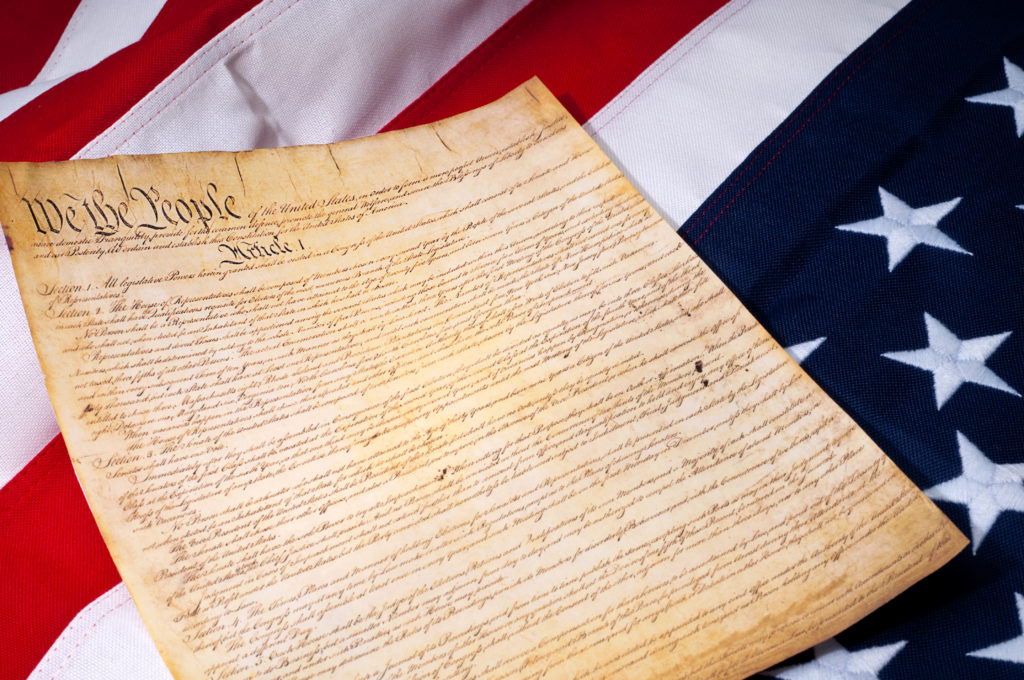
Can the state of Alabama require an ethics law class before exercising First Amendment rights? According to the Alabama Ethics Commission, it can and does. Virginia-based public interest law firm Institute for Justice filed a new federal lawsuit on behalf of Maggie Ellinger-Locke and the Marijuana Policy Project (MPP). At issue is an Alabama law requiring all registered lobbyists to attend an ethics class offered only four times a year and in only one place – Montgomery. Founded in 1995, MPP is the largest organization in the U.S. focused on ending the prohibition on marijuana. According to the group’s website: “MPP’s mission is to change federal law to allow states to determine their own marijuana policies without federal interference, as well as to regulate marijuana like alcohol in all 50 states, D.C., and the five territories.” Part of Ellinger-Locke’s job, says IJ Senior Attorney Paul Sherman in a recent op-ed, is to talk with legislators and government officials in nearly a dozen states on ways to make marijuana policy “more just, sensible and humane.” “Unfortunately for her,” Sherman writes, “all lobbyists in Alabama are required to take an in-person ethics class.” The problem is, Ellinger-Locke lives in Arlington, Virginia and works at the MPP headquarters in Washington DC. Sherman also points out that mayors, city and county council members, as well as members of local boards of education, are each required to take similar training – a program that could easily be offered online. Nevertheless, Sherman adds that such a requirement is not only bad public policy but also unconstitutional. That is why IJ filed a First Amendment challenge in federal court. “If a person wants to talk to an elected official about a matter of public policy,” Sherman concludes, “they shouldn’t have to take a government-mandated class. Instead, the only thing they should need is an opinion.” Sherman and MPP Director of State Policies Karen O’Keefe will be available to discuss the case and answer questions on the case through IJ’s conference line – 800-326-6981 (Password: 415681) – beginning 9:30 a.m. CST (10:30 EST) Wednesday.


